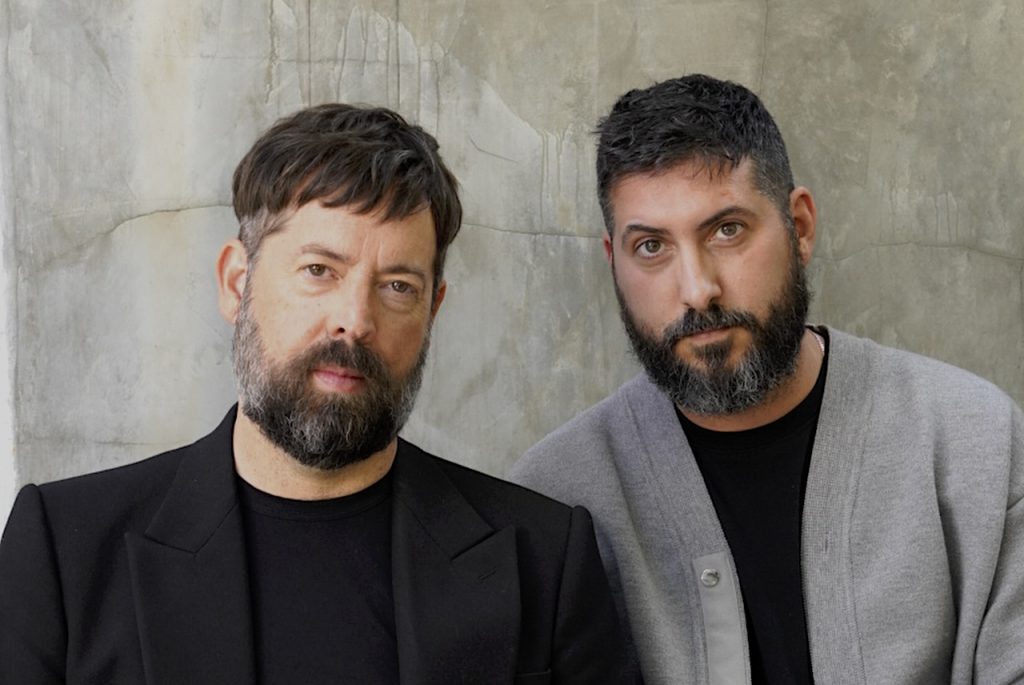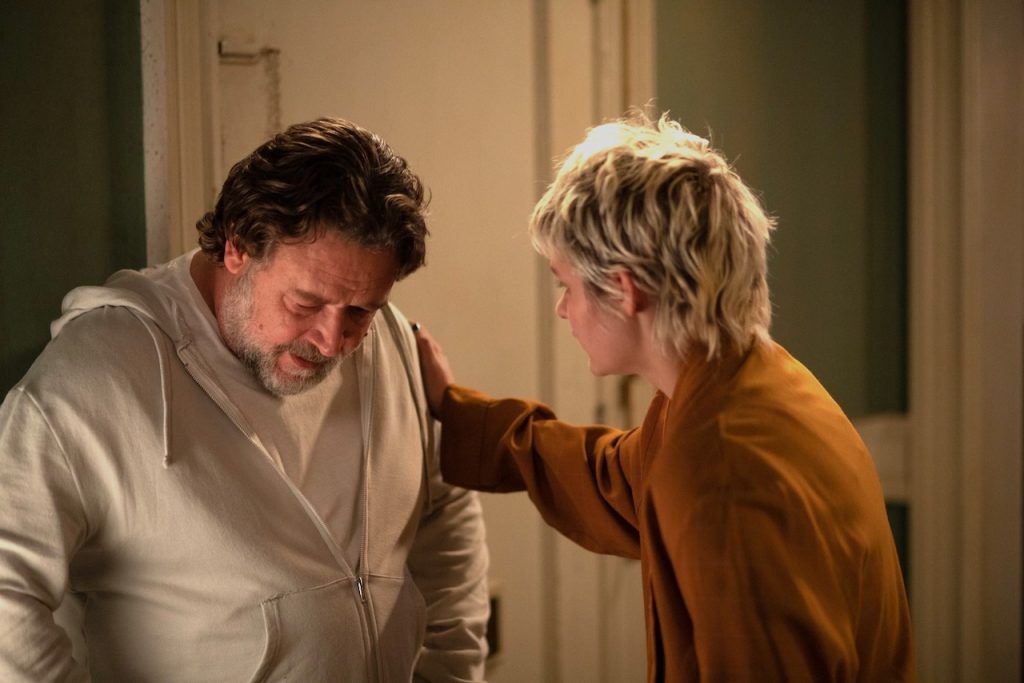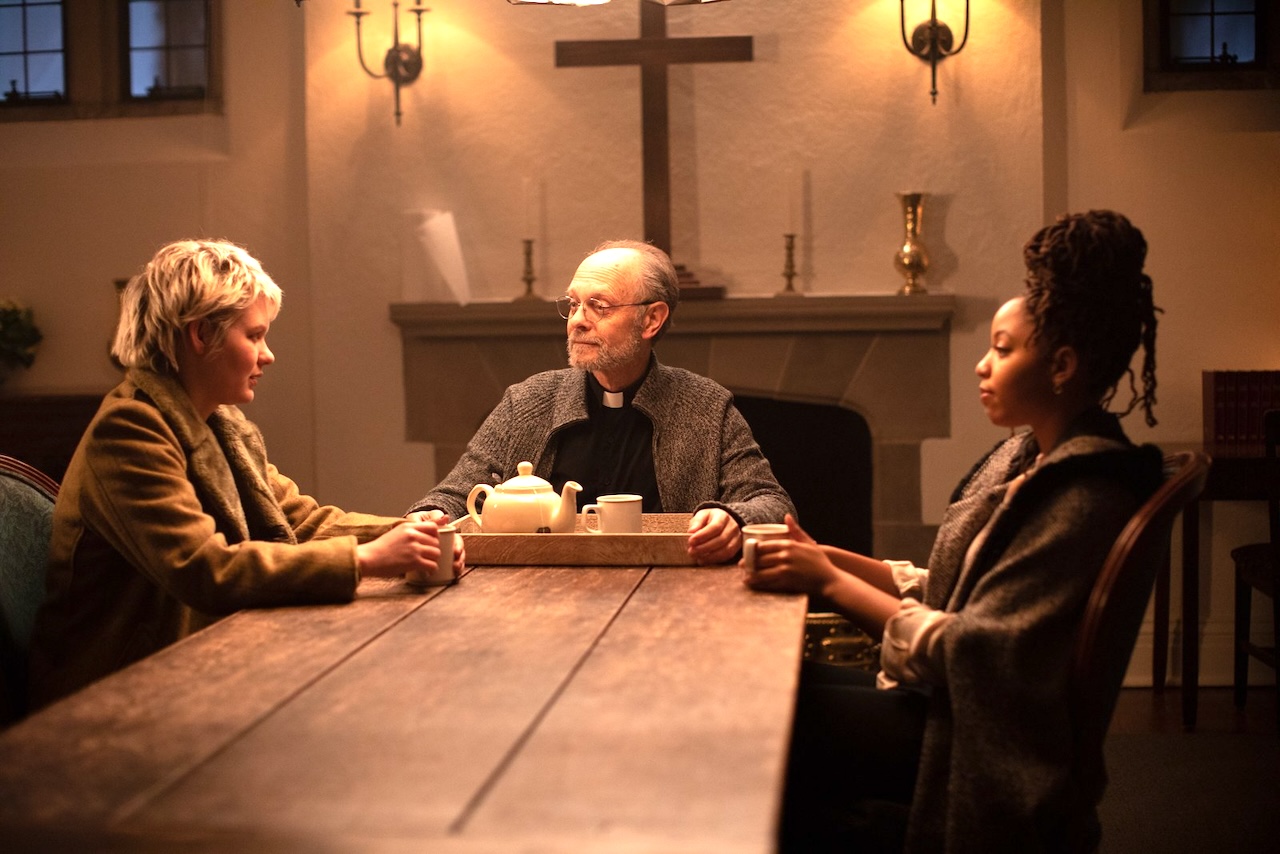When the actor who played The Exorcist’s Father Damien Karras is your dad in real life, there’s a good chance you’ve been exposed to the world of horror from a young age. Such is the case with writer and director Joshua John Miller, and he found himself veering towards creative pursuits in other genres.
But writer M.A. Fortin, a longtime fan of the scary stuff, is both his creative and life partner and the two have found that often elusive balance of working in mixed genres. They previously co-created The Final Girls and Queen of the South and their latest effort, The Exorcism, sees Russell Crowe as lead in a story that turns this particular brand of horror on its head. Crowe plays Anthony Miller, a washed-up actor looking to salvage both his professional reputation and relationship with his estranged daughter when he’s cast in a new horror film. Until, in a very meta turn of events, he begins to have some on-set supernatural experiences that further threaten both career and family.
Miller and Fortin spoke with Creative Screenwriting about subverting audience expectations with their work and the joy of blending genres.
Tell me about the origins of this story.
Miller: It came out of a conversation we had with Kevin Williamson… we had just done The Final Girls and he was a big fan of the of the film. I think that, at that time, comedies were having a hard time finding an audience. We found a devoted audience for the movie; Sony had released it in a very limited run, but there was a lot of love for it. Kevin was one of those people and we were excited to meet him – as two queer writers, he is a queer hero, of ours and in general. He was so visible and open about himself, and in the late 90s, which made him a pioneer at that point, especially for young creative people like ourselves.

Joshua John Miller and M.A. Fortin. Photo by Elisabeth Caren
So, it was really exciting to have the opportunity to collaborate with him. He wanted him to shepherd something for us to do and we just thought of ideas, things that we could potentially collaborate on. He was a big fan of The Exorcist and all of us enjoy the “meta” aspect of things. We tried to think of what could be a sort of cousin of Final Girls that would feel personal but could be a way of playing the form a little bit. That’s how the conversation started. The great thing about working with Kevin is that, in that stage of the process, he just let us build the movie that we wanted to build without much interference…which is very, very rare.
Tell me about subverting the genre, playing with the “rules” and audience expectations when it comes to this type of horror. What was your vision for this project in terms of turning things on their head?
Fortin: In those conversations with Kevin, a lot went into devising what the movie would be about. Joshua’s dad was in the greatest exorcism movie of all time… so when the genre was initially brought up, we weren’t sure. Aside from that movie, it wasn’t one that we necessarily gravitated to. There are a few that are terrific, but we always saw them as a little bit sexist, a little bit conservative. They really lean into their religiosity. These ideas that the Church will save you, or that women are desperate, vulnerable creatures that can be taken over by external forces at any time and need a man to come save them, and so on.
At the time that we were developing the movie, we felt that we were in a moment politically where it seemed like men were the ones who were the “vulnerable” ones – vulnerable to external forces or influences that were causing them to suddenly become quasi-unrecognizable in terms of how they were talking or behaving. We thought, “What would it look like to update or contort the tenets of the exorcism movie to what we’re seeing just outside our own window?”
Miller: Mark and I are partners, in life as well, and I think that we share a lot of similar tastes, even in the solo projects we’ve done. Maybe partly because I was so in the center of horror, I kind of shunned it a little bit. But being with Mark, it’s unavoidable. He loves horror so deeply. The first ten years of our relationship was… let’s call it gory!
I always loved genres like musicals as well. Somebody’s having a really dramatic conversation, and then suddenly breaking out into dance and song. Talk about tonal shifts! As a child, one of the movies I was exposed to (prematurely) was All that Jazz. In my eight-year old mind, I could see the character was sad and having bad thoughts and then there were drugs and dancing and dream sequences. I think it was probably imprinted on my brain, but in a good way. Because it means that I’m interested in the borderlands. I think the most interesting movies walk that line – like Pedro Almodovar’s films. They are erotic, sad, and funny, all at the same time. I think that that is an honest reflection of life to me. Or if you look at John Cassavetes’ work, things that were definitely informative.
I think most people assume horror films are just going to be a bunch of jump scares. That they’re machines to make studios money. Nothing against those studios that have a very particular formula – a lot of it’s really good is very much constructed to hit those points. But what we wanted to do, and this is part of that subverting of expectations, was to avoid those, and really lean into a deep character story, as much as we were allowed to within a studio film. To really make it dramatic, sad and complicated so that people who see this will realize that it’s a horror movie that will make you think or be sad, which I think is unusual. We’re interested in those unlikely flavors.

Anthony Miller (Russell Crowe) & Lee Miller (Ryan Simpkins) Photo courtesy of Miramax
Fortin: It sometimes feels like writers are discouraged from creating things that are genuinely disorienting viewing experiences… and it’s something we really reached for here. There are certain sequences in the movie where you understand that nothing good is happening, but you don’t know whether you’re allowed to laugh or if you should be terrified. Or if it’s a little bit of both, where it’s so perverse that you don’t know how to react. For us, maybe that’s the gold – not knowing what you’re watching and what to do with it.
Miller: I think mixing genres is something that is part of our collective ways. The first pilot we ever wrote, which was sort of our skeleton key to getting representation, was a mixed genre. It was a family drama, but with supernatural elements. It also had some political aspects and historical drama. This was about ten years ago, and that wasn’t really being done at the time. Things have changed a bit since then, but I remember an agent of ours – who was really smart about how to get things made – said “Look, there are piles of scripts. You have to have one where, if I pull it out of the pile, I immediately don’t even know who wrote it, but I know it’s you.” What’s our distinct voice that stands out? Everyone has their different tones or that note they’re trying to hit. We’re writing new stuff that feels “experimental” in that it’s not our traditional genre stuff.
Right now we’re writing a historical drama, and are infusing it with a lot of funny elements that would not be normal for that story. But they’re helping that big pill that has a lesson to it go down in a more interesting way. We always try to write towards that, not in a reverse engineering way, but to have more fun in the process of writing it.
We really came up as writers through television. I had started as a novelist, and Mark was writing plays. People were talking about television the way they talk about novels – it was the new American literature. This was ten years ago and it’s not that way anymore, unfortunately. But there was this moment where my favorite books were these rabbit holes to go down that really lean into character and become nuanced. In the early days, Carolyn Strauss always told the writers at HBO, “Slower, deeper.” Because Mark had more of a theatrical background and I had a novelistic background, it was very natural for us to lean into those kinds of stories.
To further answer your question about subverting expectation, I think we wanted this movie to be nuanced in this relationship and not too plot heavy… and to be about moments between the characters. I don’t think we love plot in the conventional sense, I think we’re interested in “internal plots.” With Queen of the South, no one was telling us that to subvert the genre of the gangster show was to have a Latin female gangster as the lead. There were no female Latin leads at that point, so just having one who hates white people be our main character was enough to subvert the genre.
Fortin: You know, it’s interesting to look back on. So many of the things that we’ve had success in, where something got made and was received well… there were so many times where the “wrong choice” became the blood in the veins that made it feel lively and animated and made people want to watch it.
We mine each other’s stores very well when we work together, and he’s very good at pulling me back when I go too far!
Did that collaborative ability come together naturally or did it take some time to adjust to each other’s writing styles?
Miller: When we first started writing together, we were already in a relationship. We worried about the effects of that. But I’d seen (and studied) enough visual artists, filmmakers and writers who’d collaborated in my own family. So it felt natural. But we always agreed that the relationship would be the most important thing to protect. And if there was ever a real danger or threat to that, we would back off of collaboration for a while. We’ve done that intermittently where we’ll decide, “OK, we’ve been doing a lot of stuff together, and we’re gonna kill each other. Let’s go do something else.” Sometimes we have different passions and don’t agree on the same thing. Or there’ll be an idea that Mark’s obsessed with, and I don’t have that same drive and I’ll tell him to go do it on his own. It’s like any band where someone will do the solo record sometimes.
But I think that in terms of process, each project is very different. Sometimes I’ll have a fever dream about something and will say, “We have to do this. This is it.” I’ll ramble for days upon days and Mark will go live with it for a while and come back.
I’ll tell you what doesn’t work. Having a contract to write something that you thought you could without really proving it to yourself first. So, before we ever commit to anything, ever, we write a little bit of it. We don’t go out and pitch first – we’ve done that, only to then go to write it and realize we don’t actually know how. Or we’ve convinced ourselves we can and then we’re stuck or the inspiration has vanished. We always do a trial run with the pages to make sure that we feel cellularly connected to what’s on the page and not fraudulent. You have to exist and function. But in the end, it’s hard to do something that you can’t naturally feel you have authority to, and I feel like it’s disingenuous to the people you’re selling to.
The other thing that we’ve learned – and something that we’re still working on – is to be very clear about our vision and how we see this. And to be OK if we all don’t see the same movie, agree to disagree and move on and not try to force something or allow ourselves to be manipulated into what somebody else wants that was not what we originally sold. I think most of the big battles that are waged come out ten months down the line, but could have been circumvented or handled in the first couple of weeks of development by being abundantly clear about our vision.
On this movie, we had a very particular vision. In some ways, maybe I wasn’t fully transparent that we wanted to do a much smaller chamber piece about grief. The studio was probably expecting more of a traditional horror film, but that’s not what was written. Sometimes what executives see on the page and what’s literally on the page are two different things. I think really establishing a very transparent conversation to say, “I’m making The Shining, that’s what I want to do” only to have them say “No, we don’t want The Shining, we want Insidious” – they’re two different movies. I think the key is to have those scary conversations that might affect your bank account. But it’s better to do some other job than force your will on another person’s vision or have their will forced upon yours.
Fortin: Even though it’s not a foregone conclusion that you’re going to loose in those conversations. If you’re working with the right people, having conversations like that can establish trust and serve to boost people’s confidence in you as a creator because it gives them the sense that you’re looking at it from not just your perspective, but theirs as well. It’s empowering either way.
Miller: We thrive when we’re given the space to write what’s in our heads and hearts, not thinking about the result, but purely about the story.

